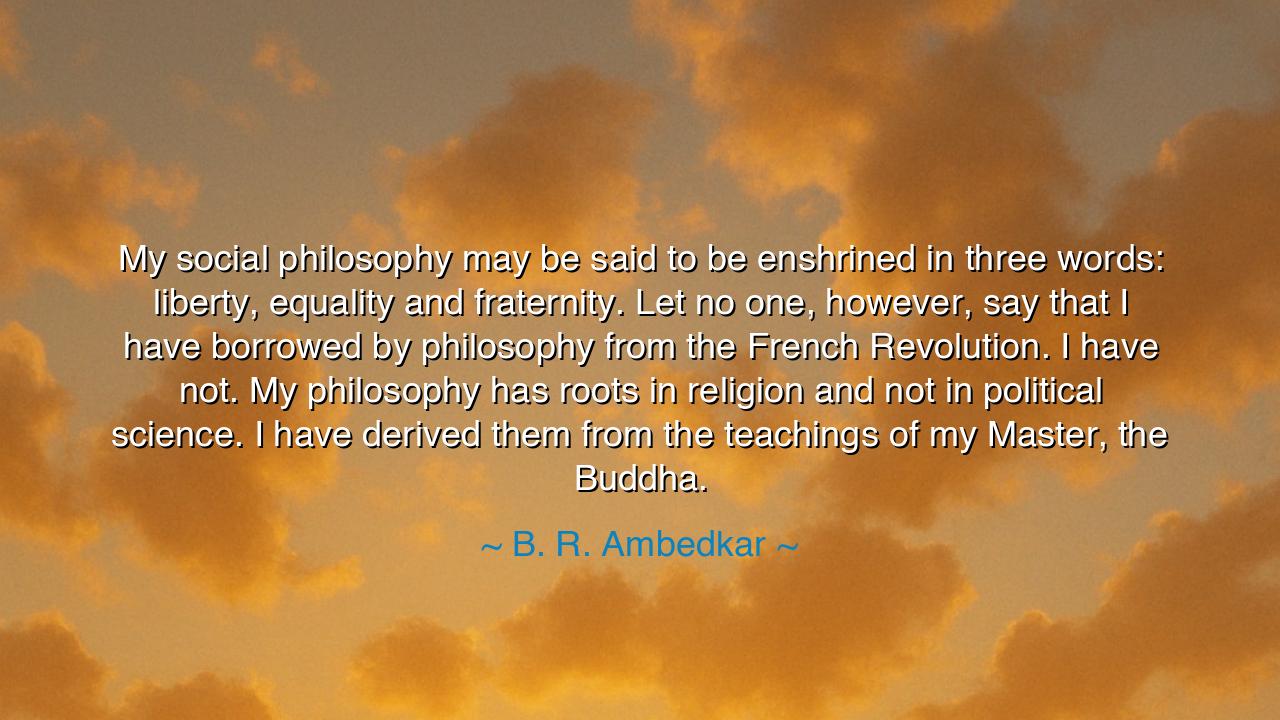
My social philosophy may be said to be enshrined in three words:
My social philosophy may be said to be enshrined in three words: liberty, equality and fraternity. Let no one, however, say that I have borrowed by philosophy from the French Revolution. I have not. My philosophy has roots in religion and not in political science. I have derived them from the teachings of my Master, the Buddha.






“My social philosophy may be said to be enshrined in three words: liberty, equality, and fraternity. Let no one, however, say that I have borrowed my philosophy from the French Revolution. I have not. My philosophy has roots in religion and not in political science. I have derived them from the teachings of my Master, the Buddha.” So declared B. R. Ambedkar, one of the great architects of modern India. In his words lies both a rejection and an affirmation: a rejection of the idea that his vision was merely borrowed from the West, and an affirmation that it springs from the deep wells of Indian spiritual tradition. To him, these three words were not slogans of revolution, but eternal truths woven into the moral fabric of human life.
The French Revolution shouted these ideals upon the streets of Paris, painting them upon banners and carving them into the memory of the world. Yet Ambedkar claimed another origin, older and perhaps purer: the teachings of the Buddha. For the Enlightened One spoke of liberation from suffering (liberty), the recognition of the equal worth of all beings (equality), and the brotherhood of compassion (fraternity). In the monasteries of ancient India, monks and nuns lived these truths centuries before the storming of the Bastille. Ambedkar sought to remind his people that the soil of their own land had birthed these ideals, and that they need not look beyond to find the philosophy of justice.
Consider Ambedkar’s own struggle as a man born into the caste system, labeled “untouchable.” He knew in his very flesh the chains of inequality, the daily humiliations that robbed men of dignity. Yet he rose through learning, through law, and through relentless struggle to proclaim that all are entitled to liberty, equality, and fraternity. His words are not abstract musings, but the distillation of a life spent tearing down the walls of oppression. In turning to the Buddha, he found not only solace but a weapon: a doctrine that declared all beings worthy of compassion, regardless of birth.
History offers a clear echo. The Buddha himself broke the chains of hierarchy, welcoming into his Sangha kings and beggars, women and men, all seated upon the same earth in pursuit of truth. In this act, he destroyed the illusion of superiority, declaring that nobility lies not in birth but in conduct. This was the soil from which Ambedkar’s philosophy grew. He wished to awaken India to this memory, to remind her that equality was not foreign, but her own forgotten inheritance.
And yet, Ambedkar did not dismiss the French Revolution outright. He acknowledged its power, but he warned against rooting one’s vision in political science alone, without the deeper ground of moral and spiritual truth. For revolutions come and go, banners rise and fall, but a philosophy grounded in religion—in compassion, in reverence for life—endures beyond the cycles of history. He sought to anchor social change not in fleeting politics, but in the eternal principles of human dignity.
What, then, is the lesson for us? That true liberty is not license, but the freedom of the soul from oppression and ignorance. That true equality is not sameness, but the recognition of equal worth and dignity in every human being. That true fraternity is not mere camaraderie, but a deep and abiding compassion that binds us to one another in joy and in suffering. Ambedkar’s words call us to build societies not on fear or power, but on these three pillars that hold up the temple of justice.
Practical wisdom follows: honor liberty by defending the freedom of thought, of speech, of conscience for yourself and for others. Honor equality by rejecting prejudice in every form—whether of caste, race, gender, or creed—and by lifting up those cast aside. Honor fraternity by choosing compassion in your daily life, by treating every neighbor as kin in the great human family. In doing so, you walk not only in the footsteps of Ambedkar, but also of the Buddha, who first lit the flame.
So let this teaching be carried forward: that the true revolution is not merely of governments but of hearts. Ambedkar’s voice resounds across the ages, reminding us that liberty, equality, and fraternity are not gifts of rulers, nor slogans of nations, but eternal truths of the human spirit. To embody them is to honor both the wisdom of the Buddha and the struggle of all who have risen against chains. Live them, and you will stand as a bearer of justice for generations yet unborn.






AAdministratorAdministrator
Welcome, honored guests. Please leave a comment, we will respond soon